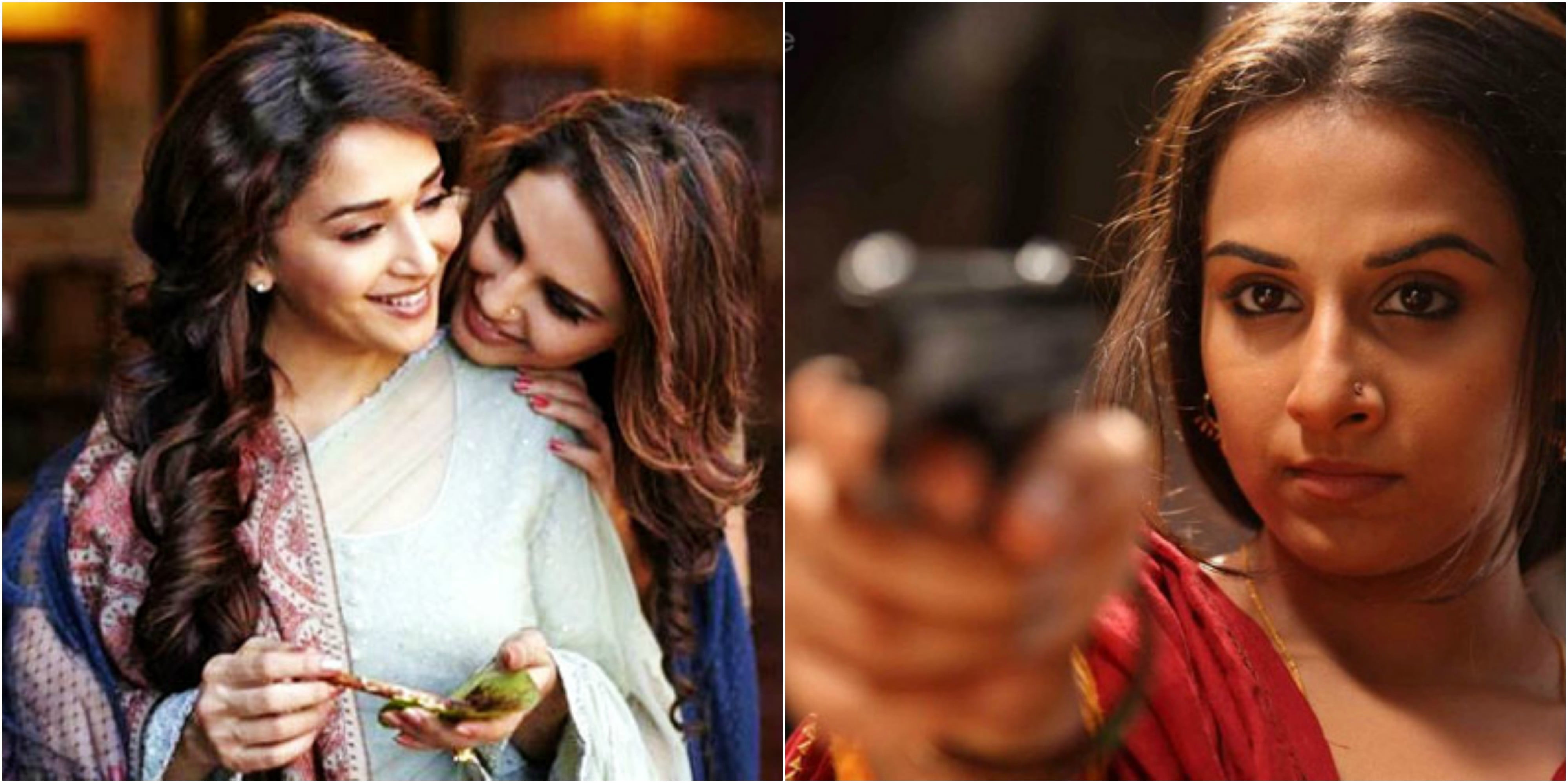Women in Abhishek Chaubey’s Ishqiya duology are remarkably different. They are beautiful (they do subscribe to conventional stereotypical notions of beauty), bold and absolutely unapologetic about it. This article tries to look at the three women in the Ishqiya duology (i.e. Ishqiya and Dedh Ishqiya) starring Vidya Balan, Madhuri Dixit and Huma Qureshi.
The women in the Ishqiya duology are not protagonists but they aren’t antagonists either. The end up taking complete control of the narratives. In both films, all three women are initially shown/represented as passive players resigned to their destiny. Of course, like most other Bollywood films, they are also subject to an initial portrayal as the bechari laachaar aurat (helpless poor women).
When it comes to sexuality, Krishna (Vidya Balan), Begum Para (Madhuri Dixit) or Muniya (Huma Qureshi) are definitely conforming to beauty norms and their appeal is also seen or made to be seen with a predominant male gaze. However, these women are aware of their appeal. They do not veil that appeal with any coyness, moral codes or any assumed and structurally internalized submissiveness of women. Instead, they make all possible use of it.
The women in the Ishqiya duology take complete control of the narratives.
Until the end, the viewers would have assumed that the plots are pacing according to plan and a ‘happily ever after’ is waiting for the characters. But it is in the climax in both romantic thrillers – where the women came out as game changers, the master planners. They make the protagonists, the two men, puppets for executing their plans and accomplish their personal goals.
In Ishqiya, Krishna, in order to take revenge on her husband, who tried to kill her (despite their passionate love towards each other), makes a plan. It seemed that she was trying to help Khalu (Naseeruddin Shah) and Babban (Arshad Warsi) and also make some profit for herself with ransom as she suggests a kidnapping. But there is another undercurrent plan at play here. With the help of ‘happy-go-lucky’ criminals like Khalu and Babban, with their skills in kidnapping, her wish for revenge has hope.
Khalu aka Iftekaar (Naseeruddin Shah) is the archetype dil-phenk-aashiq (hopelessly in love) in both films. Babban is the womanizer. In Ishqiya, Krishna holds her ground when interacting with both men. She does not hold back from expressing her desires. Her interaction with them is consensual and incorporates her needs and desires as well. She does make any promises to the two men, instead, she lives in the moment (also because her plans for her future are completely different than the oh-so-romantic plans that Khalu and Babban had in mind for her).
Also Read: The Feminist Film: Defying The Male Gaze Of Celluloid
In Dedh Ishqiya, Begum Para and Muniya have their own plan ready to execute: again, kidnapping and ransom. This time, the kidnapping is not initially planned with the two men in mind, but eventually, they become a part of it. In order to make their own way against their destiny, they unapologetically make use of their sexuality. But again, they don’t promise anything to the two men.
The Ishqiya duology is set in rural Uttar Pradesh. For a change, it was rather refreshing to see women in rural areas be more than just wallflowers, in need of rescue. In the midst of such few portrayals of rural settings (beyond Bollywood gangster movies), the characters, especially the women, have strong and complex stories to tell.
Krishna, the wife of a guerilla warrior, knows about law and how her husband can be freed soon. She keeps herself informed by visiting the court (which is not expected of a woman from her social location). She chases a stable and happy life and will do anything to get it. Even when her sexual intimacy with Babban causes jealousy and insecurity in Khalu, she keeps herself free from accountability to anyone.
it is in the climax in both romantic thrillers – where the women came out as game changers.
Muniya also has a similar attitude towards life and her interactions and mannerisms are somewhat similar to Krishna. As Dedh Ishqiya has more male characters, thus the male gaze is multiplied. Muniya being in a less respectable social position than the Begum is subject to more of the male sexual gaze. This does not faze her one bit.
Begum Para is a little different from Krishna and Muniya. Her class and the notion of being a Begum to a Nawab have conditioned her to be very different from the other two. She is not as bold as they are but she is not afraid of making choices that are supposedly ‘inappropriate’ for a Begum. She is also one of the game changers in the second (or one and a half) part of the Ishqiya duology.
Where the defiance of conventionality is concerned, it was later revealed that Muniya and Begum’s relationship was not defined by platonic, heterosexual parameters. Muniya and Begum elbow the two men out of their paths, in order to be with each other. The women in the Ishqiya duology defied every typecast based on the Bollywood ‘Beloved’ and refused to be slotted into simplistic boxes.
Also Read: Tumhari Sulu Film Review: Always Somebody’s Sulu
Featured Image Credit: Rediff and News18
About the author(s)
Gender Fluid. Queer. Feminist. Activist. Writer. Poet. Dreamer.




